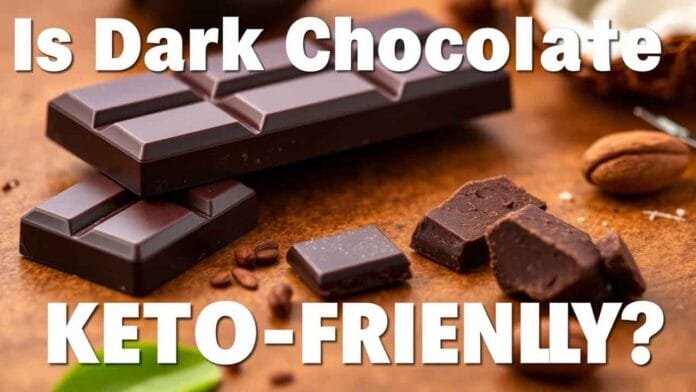If you’re navigating the ketogenic lifestyle, you’re probably on the lookout for treats that align with your low-carb, high-fat approach. One burning question that often arises is this: Is dark chocolate keto-friendly? The good news is that dark chocolate can be part of your keto lifestyle—when consumed with care. Please keep reading to uncover the secrets of keto chocolate, how to fit it into your diet, and maximize its health benefits.
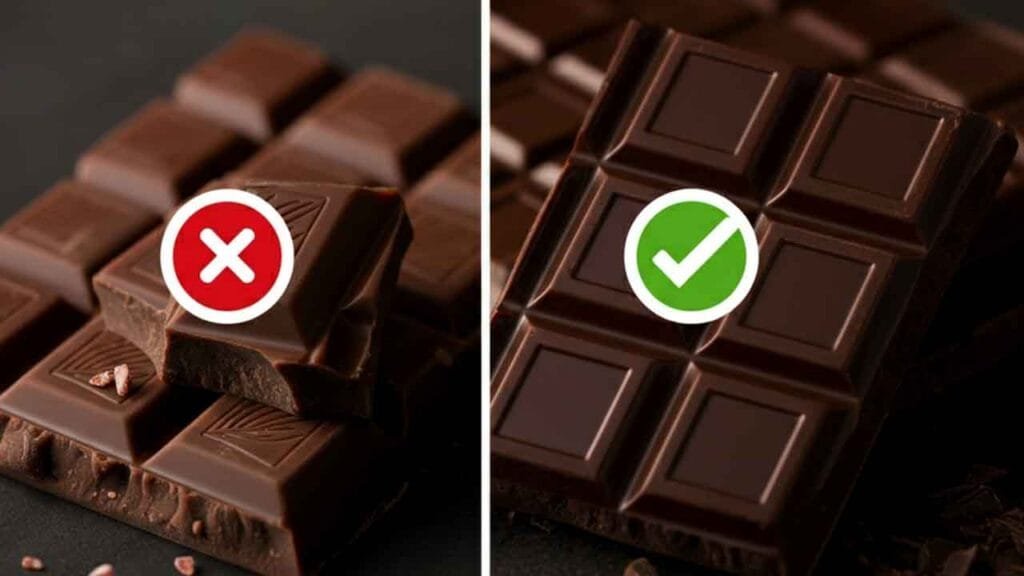
- What Makes Chocolate Keto-Friendly?
- The Science Behind Dark Chocolate and Keto
- Benefits of Keto Chocolate
- Choosing the Best Keto Chocolate
- Incorporating Keto Chocolate into Your Diet
- Keto Chocolate Brands to Try
- Beware of Pitfalls with Dark Chocolate on Keto
- FAQs About Keto Chocolate and Dark Chocolate on the Keto Diet
- 1. Is dark chocolate allowed on a keto diet?
- 2. What is keto chocolate?
- 3. How much dark chocolate can I eat on keto?
- 4. What should I look for when choosing keto chocolate?
- 5. What are the health benefits of eating dark chocolate on keto?
- 6. Can I eat milk chocolate on a keto diet?
- 7. Are there any keto-friendly dark chocolate brands?
- 8. Can dark chocolate kick me out of ketosis?
- 9. How can I add dark chocolate to my keto recipes?
- 10. Does dark chocolate have any hidden carbs?
- 11. What is the best time to eat keto chocolate?
- 12. Can I eat chocolate chips on a keto diet?
- Final Thoughts on Keto Chocolate
- Sources
What Makes Chocolate Keto-Friendly?
The ketogenic, or “keto,” diet emphasizes reducing carbs drastically while increasing healthy fats to shift your body into ketosis, a state where fat becomes the primary energy source. With that in mind, keto chocolate must meet these two conditions:
- Low in Net Carbs: Not all chocolate qualifies as keto-friendly. Traditional milk chocolate has high sugar content, which spells disaster for ketosis. Dark chocolate, specifically with a cocoa content of 70% or higher, contains less sugar and more antioxidants, making it a better option. However, you must still read labels carefully to ensure the carb content aligns with your daily keto limits.
- Minimal Additives: The best keto chocolate options exclude harmful additives like artificial sweeteners, sugar alcohols that trigger digestive upset, or unnecessary fillers.
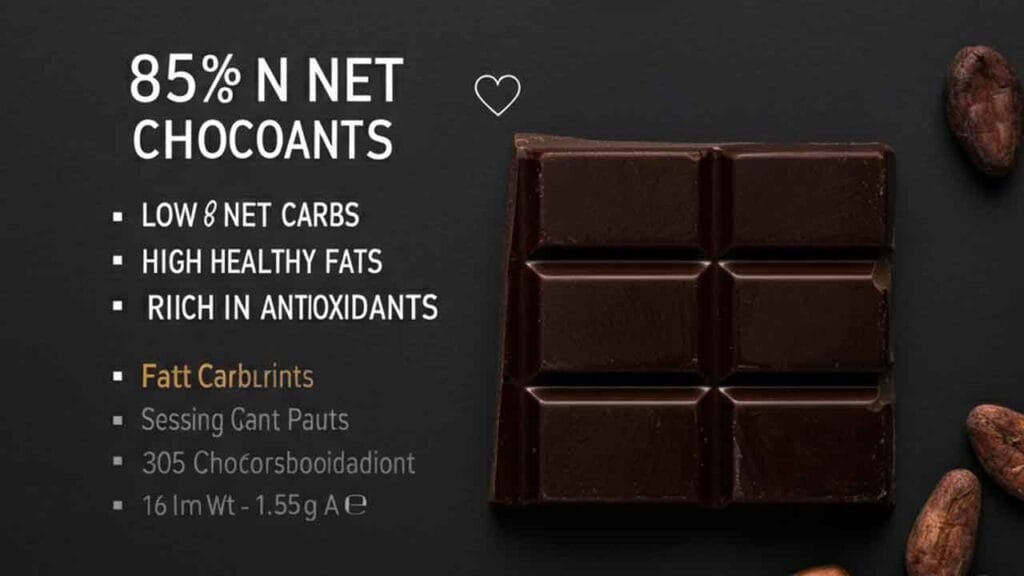
The Science Behind Dark Chocolate and Keto
Dark chocolate stands out for its nutritional profile compared to milk or white chocolate. High-quality dark chocolate (80% cocoa or more) contains minimal carbs, healthy fats, and beneficial compounds like flavonoids and polyphenols that support heart health. Here’s why it fits into the keto diet:
- Net Carbs Count: A one-ounce serving of 70–85% dark chocolate contains around 10–12 grams of total carbs, with roughly 3 grams of fiber, leaving you with about 7–9 grams of net carbs. This amount should be consumed cautiously for stricter keto dieters but can fit within your daily carbs allowance.
- Healthy Fats: Dark chocolate is also an excellent source of good fats, such as oleic acid, which can complement your macros.
- Low Glycemic Index: Foods with a high glycemic index tend to spike blood sugar levels, kicking you out of ketosis. Dark chocolate has a lower glycemic index, making it more keto-friendly than sugary candies.

Benefits of Keto Chocolate
Dark chocolate isn’t just a luxurious treat—it comes with benefits for keto dieters. Here are a few reasons to indulge responsibly:
1. Rich in Antioxidants
Cocoa is packed with flavonoids, a powerful type of antioxidant. These antioxidants can fight inflammation, improve brain function, and even help lower blood pressure.
2. Heart Health Booster
Studies suggest that dark chocolate can improve heart health by increasing “good” HDL cholesterol and reducing “bad” LDL cholesterol. This balance supports cardiovascular wellness and is critical for long-term success on keto.
3. Enhances Mental Clarity
The polyphenols in dark chocolate may also protect brain cells and improve mental performance. This is particularly relevant when you’re first adapting to the keto diet and experiencing brain fog.
4. Satisfies Sweet Cravings
If you’re starting on keto, sweet cravings can feel impossible to ignore. Keto chocolate offers a guilt-free way to indulge without sabotaging your progress.
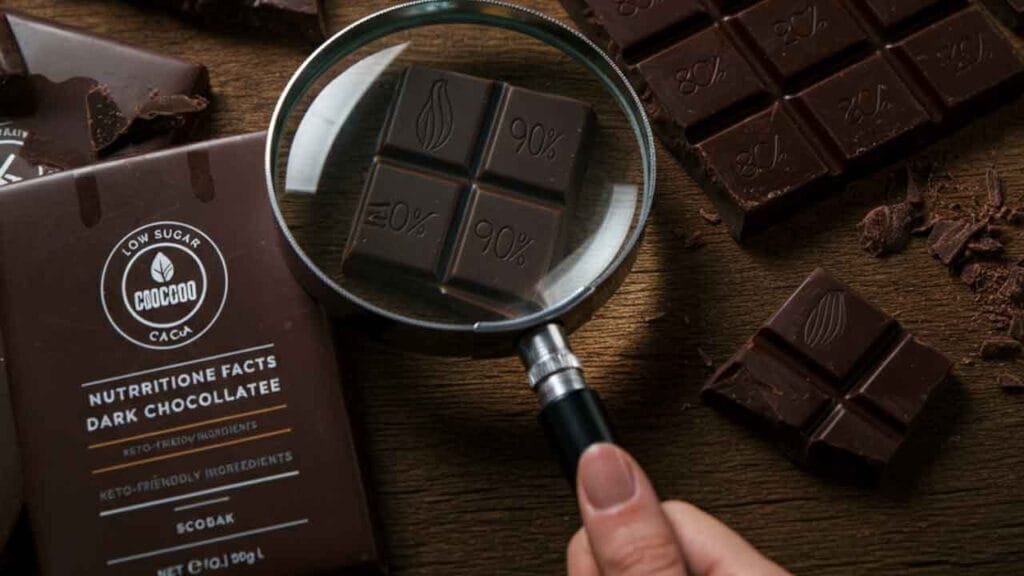
Choosing the Best Keto Chocolate
Not all dark chocolate is made equal. To ensure you’re selecting a truly keto-friendly option, follow these tips:
1. Look at Cocoa Percentage
Choose dark chocolate with at least 70% cocoa content, though 85% or higher is preferable for keeping sugar levels low.
2. Check Carbs per Serving
Read nutrition labels carefully. Aim for options with less than 5 grams of net carbs per serving.
3. Avoid Added Sugars
Skip chocolates that include cane sugar, syrups, or artificial sweeteners like maltitol, which still impact blood sugar.
4. Opt for Natural Sweeteners
Keto chocolates sweetened with erythritol, stevia, or monk fruit are excellent alternatives. These sweeteners add no significant carbs and won’t interfere with ketosis.
5. Consider Organic and Unsweetened Choices
Organic chocolates or plain unsweetened cocoa nibs are excellent choices. They contain little to no sugar while packing all the benefits of cocoa.

Incorporating Keto Chocolate into Your Diet
Here’s how you can enjoy keto chocolate without overindulging or breaking ketosis:
Snack Smartly
Stick to 1–2 small squares of keto chocolate as a snack or dessert. This minimizes your carb intake while satisfying that occasional sweet tooth.
Add to Recipes
Dark chocolate melts quickly and can be used creatively in keto recipes. Examples include:
- Keto Chocolate Mousse: Combine unsweetened cocoa powder, heavy cream, and a keto-approved sweetener for a creamy, low-carb dessert.
- Chocolate Fat Bombs: Pair melted dark chocolate with coconut oil, peanut butter, or cream cheese to create bite-sized, high-fat snacks.
- Low-Carb Trail Mix: Mix cocoa nibs with nuts and seeds for an on-the-go keto-friendly option.
Pair It with Healthy Fats
Pair dark chocolate with high-fat foods, such as almond butter or cream, to stabilize your blood sugar levels and make it even more keto-compliant.
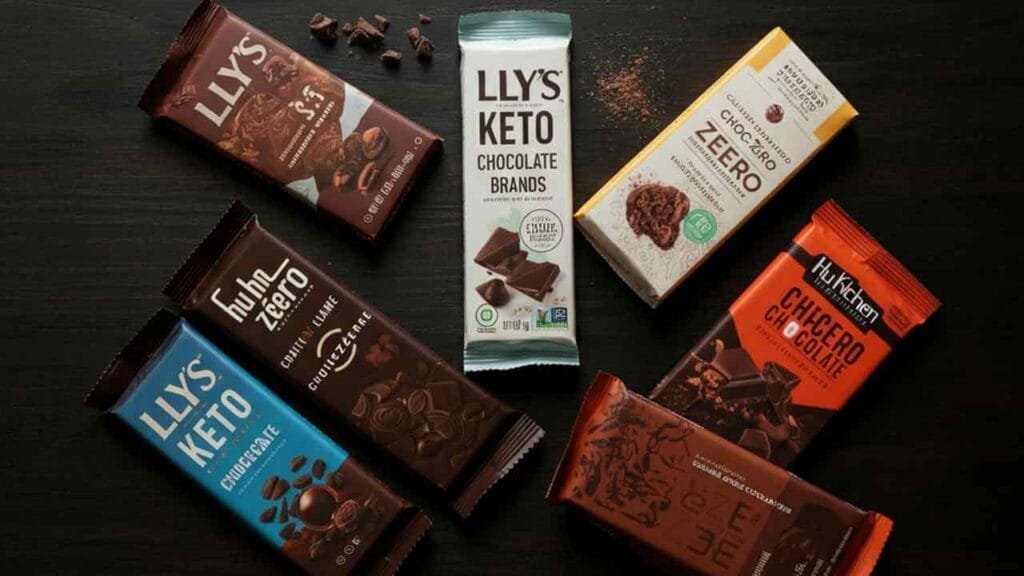
Keto Chocolate Brands to Try
Navigating the sea of chocolate brands can be overwhelming. To make your life easier, check out these popular keto chocolate options:
- Lily’s Chocolate: Sweetened with stevia and erythritol, Lily’s offers a range of keto-approved dark chocolate bars and baking chips.
- ChocZero: This brand avoids sugar alcohols and uses monk fruit as a natural sweetener. They have a selection of bars, syrups, and even bark.
- Alter Eco Organic Dark Chocolate: While not specifically keto, the higher cocoa percentage makes it an excellent low-carb choice in moderation.
- Hu Kitchen Chocolate: Made with clean ingredients, Hu’s dark chocolate blends simplicity with keto compatibility.

Beware of Pitfalls with Dark Chocolate on Keto
While keto chocolate can be a fantastic addition to your diet, there are some pitfalls to watch out for:
Overeating
Dark chocolate is calorie-dense. If you don’t practice portion control, you can easily exceed your calorie or carb limit.
Choosing the Wrong Type
Milk chocolate or low-cocoa chocolates sneaked into your pantry can derail your progress. Always verify the ingredient list before indulging.
Digestive Issues
Some people experience bloating or discomfort with certain sweeteners, such as maltitol or xylitol. Test small amounts first.
Impact on Ketosis
If you’re closely monitoring ketosis, keep track of your macros after indulging in keto chocolate to ensure it doesn’t hinder your goals.
FAQs About Keto Chocolate and Dark Chocolate on the Keto Diet
1. Is dark chocolate allowed on a keto diet?
Yes, dark chocolate can be included in a keto diet but only if it has a high cocoa content (preferably 70% or higher) and is low in sugar. Dark chocolate with minimal carbs allows you to enjoy a treat without exceeding your daily carb limit.
2. What is keto chocolate?
Keto chocolate refers to chocolate products crafted explicitly for low-carb diets. They usually contain high cocoa percentages and are sweetened with keto-friendly alternatives like stevia, erythritol, or monk fruit instead of sugar.
3. How much dark chocolate can I eat on keto?
The amount depends on your daily carb limit. For example, one or two small squares (about 10–15 grams) of high-cocoa, low-sugar dark chocolate usually contain 2-4 grams of net carbs, making it a safe occasional treat.
4. What should I look for when choosing keto chocolate?
Check the cocoa percentage—aim for 70% or higher. Also, scrutinize the carb count and ensure it’s low (preferably under 5 grams per serving). Look for chocolates sweetened with sugar-free, keto-friendly sweeteners.
5. What are the health benefits of eating dark chocolate on keto?
Dark chocolate contains antioxidants like flavanols, which support heart health, improve blood sugar control, and reduce inflammation. It’s also a source of magnesium, an essential mineral often lacking in ketogenic diets.
6. Can I eat milk chocolate on a keto diet?
Generally, no. Milk chocolate typically contains more sugar and fewer cocoa solids, meaning it has a much higher carb content, which doesn’t fit keto guidelines.
7. Are there any keto-friendly dark chocolate brands?
Yes, several brands offer keto chocolate options. Look for brands such as Lily’s, ChocZero, and Hu Kitchen, which provide low-carb and sugar-free dark chocolate varieties suitable for ketogenic diets.
8. Can dark chocolate kick me out of ketosis?
It depends on the quantity and type. Eating too much chocolate with a high carb content can surpass your daily carb allowance and kick you out of ketosis. Stick to portion-controlled amounts of keto-friendly chocolate to stay on track.
9. How can I add dark chocolate to my keto recipes?
Dark chocolate can be melted and used in keto desserts like fat bombs, low-carb brownies, or sugar-free chocolate bark. You can chop it up as a topping for keto pancakes, yogurt, or smoothies.
10. Does dark chocolate have any hidden carbs?
Some dark chocolates, especially those with less than 70% cocoa, may contain hidden sugars and carbs from additives. Always read the nutrition label to ensure it aligns with your keto goals.
11. What is the best time to eat keto chocolate?
The best time to enjoy keto chocolate is as a post-meal treat or midday snack, helping to curb cravings without compromising your macro targets.
12. Can I eat chocolate chips on a keto diet?
Yes, but make sure they are specifically labeled keto-friendly. Chocolate chips like those from Lily’s or other brands sweetened with sugar-free alternatives work well in low-carb recipes. Traditional chocolate chips, however, contain too much sugar.
Feel free to experiment with keto chocolate in moderation and discover how it fits into your Keto lifestyle!
Final Thoughts on Keto Chocolate
To answer the big question—is dark chocolate keto-friendly? Yes, it can be, provided you choose high-quality options, watch your portions, and track your macros. Incorporating keto chocolate into your diet allows you to savor a delicious and healthful treat without compromising your goals.
Call to Action
Looking to add variety to your keto lifestyle? Try experimenting with homemade keto desserts or grab your favorite keto-friendly chocolate brand today. Don’t forget to share your favorite ways to enjoy keto chocolate in the comments below—your tips may inspire others to indulge responsibly!


